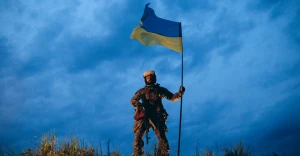
U.S.-Russia talks in Riyadh: key takeaways
Nothing indicated that the meeting in Saudi Arabia would immediately bring good news for Ukraine
As the American delegation rightly noted, "one meeting and one phone call" are still not enough to resolve Russia's war against Ukraine. Neither the 4.5 hours spent in Riyadh nor the dozens of hours still to be spent at the negotiating table will be sufficient for this. Therefore, what matters is not the number and duration of negotiations and calls.
What is critical is the substance and quality of the negotiations, which until yesterday seemed unimaginable concerning the aggressor and international criminal. Now, it is a fact and a completely new circumstance that must be recognized and proper conclusions made for the future.
The failure of Ukrainian diplomacy: This should be recorded as a fact. Why was it allowed for the meeting to take place without Ukraine? Why has there not yet been a meeting with the Ukrainian side in a similar format — foreign ministers and national security advisors? While President Trump's first call to Putin could still be seen as a misunderstanding, direct contacts with Putin's team and the announced de facto rapprochement between Washington and Moscow is a verdict on Ukrainian diplomacy. Approaches must be changed immediately if it still wants to be at the negotiating table on equal terms, not as a secondary party.
Emotional diplomacy, which allows blaming partners and allies and making impulsive decisions, must give way to a professional approach, expertise, and prudence.
The end of Russia's and Putin's isolation. Over the past 10 years, one of the key elements in protecting Ukraine's national interests has been the international isolation of the Russian aggressor. The first sanctions, imposed in 2014, were far from perfect. However, the initiated process gradually and irreversibly increased pressure. Expelling Russia from the G8 was a powerful blow to Putin's reputation, as were many subsequent decisions, including restrictions in energy, trade, finance, banking, high-tech industries, and more. After the meeting in Riyadh, this buffer is no longer untouchable, and talks about a meeting between President Trump and Putin increase the risks of reversing the achievements of the past years. If Russia’s isolation ends, the pressure on Russia will decrease significantly, with corresponding consequences for Ukraine's position. Could this have been avoided? Absolutely, if Ukraine's international activity in recent years, especially since the fall of 2023, had been based on unity and solidarity.
A trend toward Istanbul-2. As expected, the meeting in Riyadh did not change any narratives from the Russian aggressor. They continue to speak the language of ultimatums and refuse to recognize Ukraine as an equal participant in future agreements and settlements. Leaks about a supposedly "agreed condition" for conducting elections in Ukraine indicate that Kyiv is perceived not as a subject but as an object of negotiations. This explains the unchanging statements from the Russian side about the impossibility of territorial discussions, the threat of Kyiv's continued pursuit of NATO membership, and the Kremlin's rejection of any peacekeeping forces' deployment in Ukraine. While Russia's positions are not surprising, the first comments from the American side should not be ignored without reaction. A diplomatic reaction is required. Washington speaks of "inevitable compromises" that, according to them, Ukraine should prepare for. Kyiv should immediately establish clear limits on compromises that cannot include positions that depend on Ukraine’s independence, sovereignty, security, identity, and future.
It is extremely dangerous that in the U.S. press release following the talks, Washington officially uses the term "conflict in Ukraine" instead of "Russia's aggressive war against Ukraine," as was used previously. This is a fundamentally important change that could lead to a revision of positions regarding Russia's international legal responsibility, as well as its qualification as an aggressor state, with all the corresponding consequences. And from there — a return to business as usual, which must not be allowed to happen.
The approach of the Trump administration is generally understandable. It is an attempt to exit the Ukrainian-Russian "gambit" with minimal losses. The Ukrainian side should clearly understand Washington's logic of actions so that in the decisive moment, it does not find itself alone with a dozen signed agreements on so-called security guarantees, including with the U.S., which, as we have emphasized, contain neither guarantees nor security. Whatever the future agreement may be (if it indeed happens, as the Russian side will do everything possible to turn the diplomatic track into another battlefield), its main element must be a clear and effective mechanism for ensuring its strict enforcement.
About the author. Kostiantyn Yeliseyev, Ukrainian diplomat, Extraordinary and Plenipotentiary Ambassador of Ukraine.
The editorial team does not always share the opinions expressed by blog or column authors.
- News












































